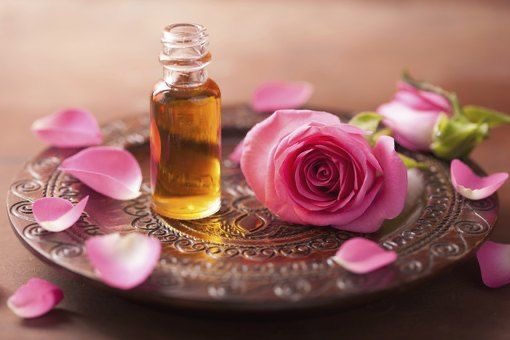The Damascene Rose has conveyed the name of Syria to the whole world and properly deserved to be included onUNESCO s Intangible Cultural Heritage of Humanity List in 2019.
Families of al-Mrah village in Damascus countryside await the season of harvesting the Damascene Rose impatiently after taking care and working on the bushes of the Rose spread in the fields of their village whose name is related to the Damascus Rose
The practices and craftsmanship associated with the Damascene rose are mainly practiced by farmers and families in Al-Mrah village , who possess expert knowledge of producing essential oils and traditional medicine from the Damascene rose, among other things, as well as the village community and families who organize the yearly Damascene Rose Festival.
The aspects of trade and economy are not limited to the industries produced by the industrial cities. There are other commercial and economic activities that constitute a good return to the Syrian economy.
The trade of Damascene Rose in Syria in general and in the village of Al-Mrah in Al-Qalamoun is an important part of the exports, which have grown significantly over the past years, and have expanded to be exported to Europe, thus competing with their counterparts in other countries.
The capital of the Damascene Rose
 Al-Mrah village is the most famous for the cultivation of the Damascene rose, and it constitutes 50% of Syria’s annual production. It is one of the fertile environments for planting flowers, and it has been characterized by this for many years, to introduce this natural product to the markets of Europe, Asia and the Gulf countries, with an annual production of millions of Damascene roses.
Al-Mrah village is the most famous for the cultivation of the Damascene rose, and it constitutes 50% of Syria’s annual production. It is one of the fertile environments for planting flowers, and it has been characterized by this for many years, to introduce this natural product to the markets of Europe, Asia and the Gulf countries, with an annual production of millions of Damascene roses.
Mansour Abbas, a resident of the village of Al-Mrah, said “Our main work is to grow the Damascene rose, and most of our income from it, as we spend most of our time caring for this beloved flower adding the village’s economy depends on the production of rose water that reach everywhere in Syria even abroad , in addition to the rituals of collecting roses, which attract many tourists.
Abbas called for paying more attention to scientific research on the Damascene rose, establishing a guidance department in the village of Al-Mrah , providing it with technicians and specialists to solve the problems facing farmers, especially insect and fungal infections, and carrying out integrated control of the fields, establishing a nursery for the production of rose seedlings in the village’s lands.
Head of the Damascene Rose Association in the village of“Al-Mrah” Amin Bittar said that most of the shops in the village produce and sell Damascene rose water which is extracted in a traditional way dating back years.
He pointed out that production varies from year to year, as rain plays a big role in the quantity of production as in the good season, the town’s production of the Damascene rose reaches 50-60 tons.
Aisha Al-Mahmoud , one of the many workers who harvests roses said “Every day of the harvesting season we live wonderful moments. The smell of the Damascene rose brings happiness to our souls.”
In turn, the farmer Hussain Fares stressed “ This non-traditional agriculture is economically feasible, as its production is intensive and the demand for it is great in local markets” calling for reviving investment in this field . The village of “Al-Mrah” overcame the climatic and natural conditions, and the lack of technical expertise in the cultivation of the Damascene rose, so it began its actual production of the rose through vast farms that attracted many investors .
Engineer Ayman Tabani, head of the Planning and International Cooperation Office in Nabek Agriculture Department said that there is a study based on the directives of the Presidency of the Council of Ministers to establish an agricultural department for the distillation and extraction of rose oil, indicating If this department is successful, it will be reflected positively on the cultivated areas and their development, as it will attract and market the production of Damascene rose.
Rawaa Ghanam

